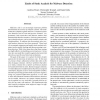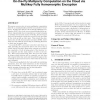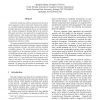81 search results - page 12 / 17 » On the (Im)possibility of Obfuscating Programs |
113
click to vote
GECCO
2006
Springer
15 years 5 months ago
2006
Springer
In this work, we employed genetic programming to evolve a "white hat" attacker; that is to say, we evolve variants of an attack with the objective of providing better de...
127
click to vote
ACSAC
2007
IEEE
15 years 8 months ago
2007
IEEE
Malicious code is an increasingly important problem that threatens the security of computer systems. The traditional line of defense against malware is composed of malware detecto...
161
click to vote
VEE
2012
ACM
13 years 9 months ago
2012
ACM
Process-level virtualization is increasingly being used to enhance the security of software applications from reverse engineering and unauthorized modification (called software p...
147
click to vote
STOC
2012
ACM
13 years 4 months ago
2012
ACM
We propose a new notion of secure multiparty computation aided by a computationally-powerful but untrusted “cloud” server. In this notion that we call on-the-fly multiparty c...
112
click to vote
ACSAC
2007
IEEE
15 years 8 months ago
2007
IEEE
Detection of malicious software (malware) by the use of static signatures is often criticized for being overly simplistic. Available methods of obfuscating code (so-called metamor...



